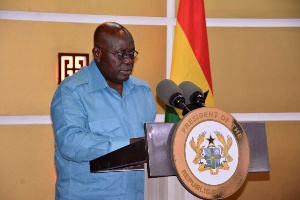As part of measures to reduce the cost of doing business in the country, government has set a target to reduce the time it takes to clear a container from the port to a maximum of four hours.
President Nana Addo Dankwa Akufo-Addo, who announced this when he launched a book titled ‘Making Africa Work’, said importers would, by the end of the year, spend very little time to clear their goods from the ports.
He said the government was undertaking reforms at the port as part of measures to reduce the cost of doing business to make Ghana the most business friendly country in Africa.
The 310-page book, authored by Olusegun Obasanjo, former President of Nigeria, Greg Mills, Jeffrey Herbst, and Dickie Davis gives an insight into the challenges facing the African continent and proposes practical solutions to the challenges.
While recommending the book to all Ghanaians, President Akufo-Addo said his administration was undertaking a number of reforms aimed at making Ghana a country beyond aid.
From September 1 this year, he said activities at the ports would be paperless to minimise all the human interference in the clearing and forwarding process.
At the same time, he said the government would remove all internal customs barriers along the highways and put in place mandatory joint inspection of shipments at the ports.
President Akufo-Addo believes the three policies would, to a large extent, reduce the burden of businessmen who spend days to clear their goods due to the cumbersome nature of the country’s ports.
He said Ghanaians voted overwhelmingly for him seven months ago to tackle the twin issues of corruption and job creation.
“On the key issue of job creation, we recognise that the ability of government to create jobs on its own is limited. Job creation is largely a private sector phenomenon. It is for this reason that we have set out to build the most business friendly economy in Africa”
“We are, therefore, moving quickly to create an environment that will unleash the innovative and entrepreneurial instincts of the Ghanaian people to drive rapid growth and job creation. The major opportunities for job creation that my government is pursuing are in a few selected areas” he said.
The President said when he took over from the previous administration; the country’s economy had a fiscal deficit of 9.3 per cent, a debt to Gross Domestic Product (GDP) ratio of 73 per cent, and a growth rate of 3.6 per cent, the lowest in over 20 years.
He said the government quickly moved to restore fiscal discipline by passing a budget that would bring down the deficit to 6.3 per cent by the end of 2017.
President Akufo-Addo indicated that the economy had began responding positively to the development, with interest rates on the money markets declining, exchange rate stabilising, declining inflation and an economic growth that had picked up in the first half of the year.
“We are going to pass a new law that will limit Ghana’s fiscal deficit going forward to between three per cent and five per cent of GDP in any given year,” he added.
He said the first budget of his administration had introduced significant tax reforms including the abolition of levies imposed on ‘kayayei’ by local authorities, abolision of the one per cent Special Import Levy, and the abolition of the 17.5 per cent VAT/NHIL on domestic airline tickets.
He said the government had also abolished the 17.5 per cent VAT/NHIL on financial services, 17.5 per cent VAT/NHIL on selected imported medicines, that were not produced locally, and the five per cent VAT/NHIL on Real Estate sales.
He said the government had also abolished the duty on the importation of spare parts, reduced Public Lighting Levy from five per cent to two per cent, and reduced special petroleum tax rate from 17.5 per cent to 15 per cent.
“We expect these tax reforms, which individuals and businesses are benefiting from, to provide incentives for increased production of goods and services”.
President Akufo-Addo said industrialisation, through value addition to raw materials, was another major opportunity for job creation in the country and indicated that the government’s One-District-One-Factory Policy would create thousands of jobs in the country.
General News of Friday, 28 July 2017
Source: ghanaiantimes.com.gh

















